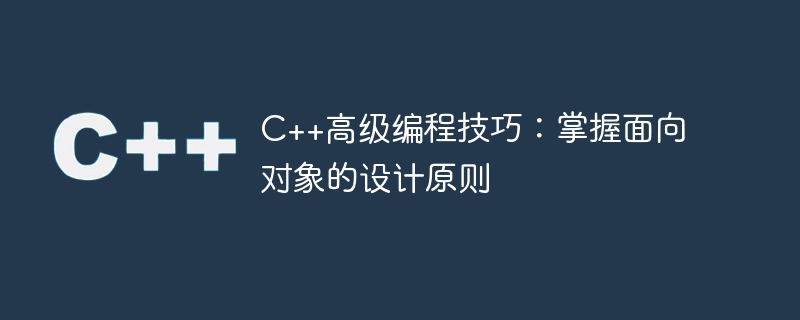

C As a high-level programming language, object-oriented programming is one of its most important features. As the complexity of programs increases, how to apply object-oriented design principles in code has become one of the skills that developers must master. This article will introduce the five design principles of object-oriented programming, namely SOLID principles, to help C developers write more robust and maintainable code.
SOLID principles were proposed by Robert C. Martin in 2000. It refers to the five object-oriented design principles, namely the Single Responsibility Principle (SRP), the Open Closed Principle (OCP), the Liskov Substitution Principle (LSP), the Interface Separation Principle (ISP), and the Dependency Inversion Principle (DIP).
1. Single Responsibility Principle (SRP)
The single responsibility principle requires that a class is only responsible for one thing, that is, a class should have only one reason for its change. If a class has multiple responsibilities, when one of the responsibilities needs to be modified, other responsibilities may also need to be modified, which will increase the coupling and complexity of the code.
For example, in a membership management system, a member class is responsible for both member information management and member points management. If a certain responsibility in this class needs to be modified, it may affect another responsibility, causing system instability. The solution is to extract the responsibilities of points management and create an independent points management class so that each class is only responsible for one thing.
2. Open-Closed Principle (OCP)
The open-closed principle requires that a software entity should be open to extensions and closed to modifications. This means that we should be able to extend the functionality of the system without modifying the source code. In order to do this, we need to use interfaces and abstract classes to limit the scope of changes in the code.
For example, there are multiple graphics classes in a graphics library. If we need to insert a new graphics class, we can use an interface or abstract class to define a graphics base class, and all other graphics classes inherit from this Base class. In this way, when we insert a new graphics class, we only need to create a new subclass that inherits from the graphics base class without modifying the existing code.
3. Liskov Substitution Principle (LSP)
The Liskov Substitution Principle is a further constraint on the inheritance relationship. It requires that a subclass can replace its parent class and ensure the correctness of the program. This means that a subclass should be able to be used in all places where the parent class can be used, and return the same results as the parent class.
For example, if we have a base class of animals and a subclass of birds, we need to ensure that in any code based on animal objects, using bird objects will not destroy the correctness of the program. This requires birds to inherit from the animal class and implement all methods defined in the animal class to ensure the scalability and stability of the code.
4. Interface Separation Principle (ISP)
The interface separation principle requires that the client should not rely on interfaces it does not need, that is, a class should not force methods it does not need. . The core idea of ISP is to make the interface as detailed as possible and split the large interface into multiple small interfaces.
For example, if we have a human and a worker, the human has two methods of eating and talking, and the worker has two methods of working and resting. If we use an interface to represent humans and workers, then this interface contains four methods, two of which are not needed by the worker class, which violates the ISP principle. We can split this interface into two, one representing the human interface and the other representing the worker interface, to avoid unnecessary coupling.
5. Dependency Inversion Principle (DIP)
The dependency inversion principle requires that high-level modules should not depend on low-level modules, but should rely on the abstract interfaces of low-level modules. This means that we should invert the dependency relationship so that the abstraction does not depend on the concrete implementation.
For example, a log module depends on a file operation module. If the log module is hard-coded to depend on a specific file operation module, then when we need to replace the file operation module, we must significantly modify the code of the log module. And if we use an abstract interface and encapsulate the file operation module into an abstract class that promises to implement certain interfaces, the log module only needs to rely on this abstract interface. Even if the file operation module is replaced, there is no need to modify the code of the log module.
Summary
Mastering SOLID principles can allow us to better implement object-oriented programming and write more robust, scalable, and easy-to-maintain code. These five principles are not absolute rules. We need to apply them based on experience and common sense based on specific scenarios and project needs. Through continuous practice and summary, we can improve our design and development capabilities and write better C programs.
The above is the detailed content of C++ Advanced Programming Skills: Master Object-Oriented Design Principles. For more information, please follow other related articles on the PHP Chinese website!




